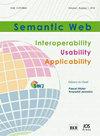语言学(O)D和NLP视角下的人文学科语义变化研究
IF 2.9
3区 计算机科学
Q2 COMPUTER SCIENCE, ARTIFICIAL INTELLIGENCE
引用次数: 6
摘要
本文概述了用于检测和表示语义变化的LL(O)D和NLP方法、工具和数据,以及它们在人文学科研究中的主要应用。本文的目的是为成本行动Nexus Linguarum的人文用例中的工作流和一组多语言历时本体的构建提供起点,欧洲网络以网络为中心的语言数据科学,CA18209。该调查侧重于了解当前趋势和在该研究领域构建应用程序所需的基本方面。本文章由计算机程序翻译,如有差异,请以英文原文为准。
LL(O)D and NLP perspectives on semantic change for humanities research
This paper presents an overview of the LL(O)D and NLP methods, tools and data for detecting and representing semantic change, with its main application in humanities research. The paper’s aim is to provide the starting point for the construction of a workflow and set of multilingual diachronic ontologies within the humanities use case of the COST Action Nexus Linguarum, European network for Web-centred linguistic data science, CA18209. The survey focuses on the essential aspects needed to understand the current trends and to build applications in this area of study.
求助全文
通过发布文献求助,成功后即可免费获取论文全文。
去求助
来源期刊

Semantic Web
COMPUTER SCIENCE, ARTIFICIAL INTELLIGENCEC-COMPUTER SCIENCE, INFORMATION SYSTEMS
CiteScore
8.30
自引率
6.70%
发文量
68
期刊介绍:
The journal Semantic Web – Interoperability, Usability, Applicability brings together researchers from various fields which share the vision and need for more effective and meaningful ways to share information across agents and services on the future internet and elsewhere. As such, Semantic Web technologies shall support the seamless integration of data, on-the-fly composition and interoperation of Web services, as well as more intuitive search engines. The semantics – or meaning – of information, however, cannot be defined without a context, which makes personalization, trust, and provenance core topics for Semantic Web research. New retrieval paradigms, user interfaces, and visualization techniques have to unleash the power of the Semantic Web and at the same time hide its complexity from the user. Based on this vision, the journal welcomes contributions ranging from theoretical and foundational research over methods and tools to descriptions of concrete ontologies and applications in all areas. We especially welcome papers which add a social, spatial, and temporal dimension to Semantic Web research, as well as application-oriented papers making use of formal semantics.
 求助内容:
求助内容: 应助结果提醒方式:
应助结果提醒方式:


